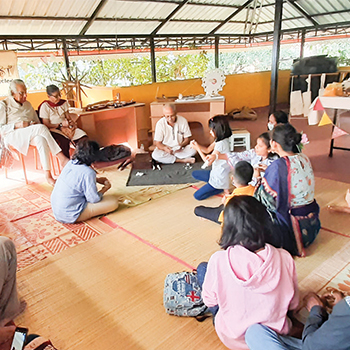Weaving an eco-friendly future

Dedicated to protecting and preserving the environment, eCoexist, is a social enterprise, which began in 2006 with an investment of `1 lakh, and has now taken a lead, promoting the famous mantra of “recycle, reuse, and reduce”. While it is often believed that startups emerge as solutions to problems that prevail in society, Manisha Sheth, founder, eCoexist Enterprise, started working on this cause when it lacked attention on a large scale. Notably, over the past 18 years, the enterprise has consistently operated without experiencing any losses or taking loans, and has continued to stay active since its inception
Founded in 2006, eCoexist Enterprise resolves the environmental issues pertaining to the toxicity of chemicals and waste management. Manisha Sheth, founder, eCoexist Enterprise and eCoexist Foundation, is an architect, environmentalist, and mentor who has been always passionate for green design and business, which inspired her to establish this social enterprise solely focused on environmental and social objectives.
A business with purpose
Through eCoexist, as Manisha says, she is able to contribute to saving the environment and generate livelihoods for underprivileged people. She said, “The first goal of eCoexist is to protect our natural resources. The need for livelihoods, especially for those who are underprivileged, is our next priority. Business is only a tool which allows the first two to happen”. The company provides income to underprivileged producer groups through their commercial activities. The aim is to create surplus that can be equitably shared and not profit just for the owner of the business.
eCoexist follows the philosophy of trusteeship, which encourages all team members to become stewards and trustees of the surplus they generate. “Since our approach and priorities are very clear, we have never faced a conflict between our business goals, and our environmental and social mission—the business is meant to serve them, not the other way around,” said Manisha.
"eCoexist is not a business; it is a community—we have been supported and sustained by those who love and believe in us"
- Manisha Sheth
The beginning of eCoexist
Manisha’s passion for environmental conservation ignited during her stay in a Gurukul in her teens. Later, she started working with the Kalpavriksh Environment Action Group and was exposed to various environmental work from rural level to international forums in this period. Through this work, she realised the need for doing environmental conservation work, which inspired her to establish her own startup with an aim to creating solutions.
A community-driven approach
Manisha established eCoexist on her own, but over time, it has grown to include a team of seven full-time employees, approximately 20 women in Awhalwadi, a village near Pune, Maharashtra, who are offered job opportunities, and additionally there are several voluntary members. “Since we invest a lot in the people who work with us, be it prisoners or women in self-help groups or ragpickers, the work we do with them affects them and us deeply as well. This impact will be seen in the way our lives evolve,” she explains. “We have worked with both rural and urban people, and we start by trying to deeply understand their context and help them identify their core issues,” emphasises Manisha.
Initiatives that preserve nature

With eCoexist, the team has come up with different environment conservation initiatives which, according to Manisha, will effectively contribute to long-term environmental conservation. One of these initiatives was the Nirmalya (sacred flower offerings) Collection and Recycling Programme with the SWaCH Coop—began as a collaboration in 2009. Under this programme, the Swach team now collects around 150 tonnes of Nirmalya. “We were the first ones in Western India to offer natural Holi colours made with turmeric in 2006 and created a market where none existed. Now in 2024, several brands are supplying safe colours for Holi,” said Manisha.
The eCoexist team dedicated eight years to developing the Holi colours with a group of women farmers in Karnataka, who eventually created their own brand and took on their own marketing. “eCoexist continues to be a small organisation, yet our work has reached the far shores. This comes from the dedication to the causes we work for. We are known and appreciated for the manner in which we have taken our environmental and social dreams to heart. eCoexist is not a business; it is a community—we have been supported and sustained by those who love and believe in us,” she added.
eCoexist expanded its product line from natural Holi colours to include eco-friendly Ganesh idols, cloth and canvas bags, natural dyed fabrics, and home décor accessories. Each of these ideas are conceptualised by them from scratch and then brought to market with a network of distributors and partners.
Overcoming challenges
Throughout its 18-year journey, eCoexist has maintained a steady presence without suffering any loss, because it remains responsive to change. During the Covid lockdown, their women’s group immediately switched from stitching cloth bags to cloth masks and were able to lead a network of five other NGOs in creating thousands of masks.
However, in order to make a lasting impact, one must overcome not only professional challenges but also personal obstacles. Despite facing stress in her personal life, Manisha persevered to keep her passion and conviction alive. She said, “Challenges have always been part of our journey. eCoexist began two years before my marriage dissolved. I found myself alone with no money and no home of my own. Starting from rock bottom, eCoexist has somehow survived many roadblocks, and I have survived and thrived with it”.
She further added, “Our biggest challenge may have been the fact that we were always ahead of the game and therefore had to wait a long time for the markets to catch up. This was solved with faith and perseverance and also a strict discipline in financial management.
Eco-sensitive products
eCoexist promotes eco-sensitive products and lifestyles through socially sensitive means. The company products are non polluting and provide an income to underprivileged groups. “My focus is mostly on the present—as goals present themselves and we strive to reach further and further each year. If eCoexist is relevant, it will have a role to play; if not, it will dissolve. I believe that it takes many different factors to bring about deep and everlasting change in a society,” said Manisha.
Staying ahead of the game
Solving a trending problem in the market gets quick attention for the product, however addressing an issue in the non-trending market makes it hard to succeed. According to the founder of eCoexist, their approach to problem-solving has always been ahead of its time. There were moments when she felt like giving up and discouraged; something would happen to inspire her again. Manisha informs, “We started working on the issue of single-use plastic bags in 2010—offering reusable cloth bags to consumers. They did not even want to pay Rs 10 per bag in the early years. Eight years later, the government of Maharashtra banned single-use plastic bags; until then, we trained many women to make cloth bags and had established a steady market for them. Yet in 2022, the ban was revoked, and SUD bags started to appear again”.
Despite the ups and downs, the company remains committed to its vision of addressing environmental issues. “We will do whatever it takes to strive towards this vision,” says Manisha .
Working for a greener tomorrow
Large-scale industries, as Manisha says, can themselves become polluting beyond a certain point. So, the company has set an objective to touch an optimal scale in everything they do to avoid creating a negative footprint. “We do not believe in expansion for its own sake. If something needs to expand, it will. Else, a decentralised model of replication is also an option,” she said. “Further, the entire paradigm of competition on which mainstream business focusses is unsustainable for humanity and for nature—we don't compete, we collaborate,” she adds.
eCoexist, as Manisha believes, has always played the role of bridge building. The enterprise is equally comfortable with grassroots activities as it is with its design and commerce. “Our vision is not simply to market eco-friendly goods made by the under privileged but to bring about a larger, sustainable and balanced relationship across various economic sections of society. 'Leave no footprint' is the ecological principle we follow in our work," concludes Manisha, reaffirming that her primary concern is to nourish life in all its senses. For this, Nature is her only true guide.